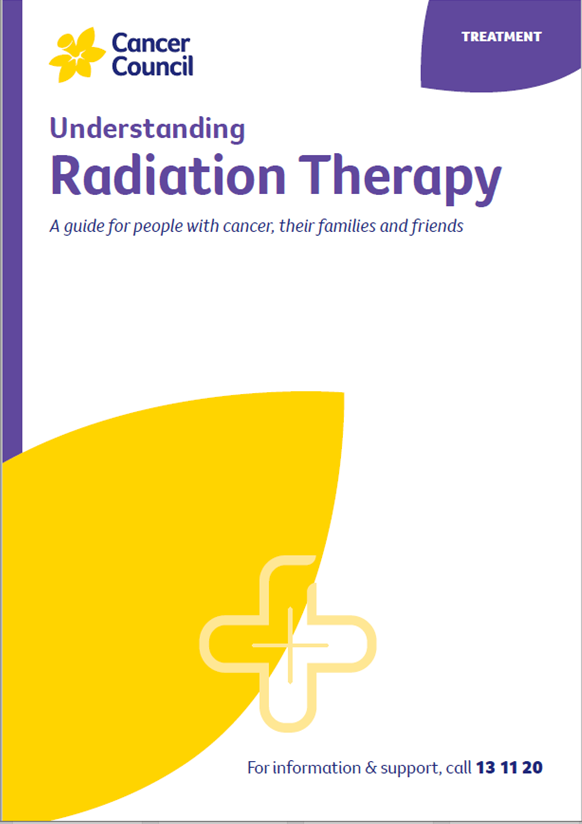- Home
- Cancer of the uterus
- Treatment
- Radiation therapy
- Side effects of radiation therapy
Side effects of radiation therapy
The side effects you have will vary depending on the type and dose of radiation, and the areas treated. Brachytherapy tends to have fewer side effects than EBRT. Side effects often get worse during treatment and just after the course of treatment has ended. Short-term side effects usually get better within weeks of finishing treatment.
Short-term side effects
| fatigue | Your body uses a lot of energy to recover, and travelling to treatment can also be tiring. The fatigue may last for weeks after treatment ends. |
| bladder and bowel changes | Radiation therapy can cause inflammation and swelling of the bowel (radiation proctitis) and bladder (radiation cystitis). Bowel movements may be more frequent, urgent or loose (diarrhoea), or you may pass more wind than usual. Less commonly, there may be blood in the faeces (poo or stools); talk to your treatment team if you notice this. You may also pass urine (wee) more often or with more urgency. |
| nausea and vomiting | Because the radiation therapy is directed near your abdomen, you may feel sick (nauseous), with or without vomiting, for several hours after each treatment. Your doctor may prescribe anti-nausea medicine to help prevent this. |
| vaginal discharge | Radiation therapy may cause or increase vaginal discharge. Let your treatment team know if the discharge smells or has blood in it. Do not wash inside the vagina with water or other fluids as this may cause infection. |
| skin redness, soreness and swelling | The vulva and the skin in the groin area may become sore and swollen. The area may look pink or red and feel itchy, and then peel, blister or weep. Your treatment team will recommend creams and pain relief to use. Wash the vulva with lukewarm water or weak salt baths; avoid perfumed products; and wear loose-fitting, cotton underwear. |
Long-term or late effects
Some side effects can continue for longer. Other side effects may not show up until many months or years after treatment. These are called late effects.
| hair loss | You may lose your pubic hair. Sometimes, this can be permanent. Radiation therapy to the pelvis will not affect the hair on your head or other parts of your body. |
| bladder and bowel changes | Bowel changes, such as diarrhoea, wind or constipation, and bladder changes, such as frequent or painful urination, can arise months or years after treatment. Bleeding from the bowel or bladder can also occur. In rare cases, there may be loss of bowel control (faecal incontinence) or blockage of the bowel. Let your doctor know about any bleeding or if you have pain in the abdomen and difficulty opening your bowels (pooing). |
| lymphoedema | Radiation can scar the lymph nodes and vessels and stop them draining lymph fluid properly from the legs, making the legs swollen. This can occur months or years after radiation therapy. The earlier lymphoedema is found, the easier it is to treat. Look for early signs in the legs, including feelings of tightness or heaviness; tighter clothing; skin pitting; and swelling that comes and goes. |
| narrowing of the vagina | The vagina can become drier, shorter and narrower (vaginal stenosis), which may make sex and pelvic examinations uncomfortable or difficult. Your treatment team will suggest ways to prevent this. |
| menopause | If you are premenopausal, radiation therapy to the pelvis can stop the ovaries producing hormones, causing early menopause. Your periods will stop, you will no longer be able to become pregnant and you may have menopause symptoms. |
→ READ MORE: Chemotherapy for cancer of the uterus
Podcast: Making Treatment Decisions
Listen to more of our podcast for people affected by cancer
More resources
A/Prof Orla McNally, Consultant Gynaecological Oncologist, Director Oncology/Dysplasia, Royal Women’s Hospital, Honorary Clinical Associate Professor, University of Melbourne, and Director of Gynaecology Tumour Stream, Victorian Comprehensive Cancer Centre, VIC; A/Prof Yoland Antill, Medical Oncologist, Peninsula Health, Parkville Familial Cancer Centre, Cabrini Health and Monash University, VIC; Grace Guerzoni, Consumer; Zeina Hayes, 13 11 20 Consultant, Cancer Council Victoria; Bronwyn Jennings, Gynaecology Oncology Clinical Nurse Consultant, Mater Hospital Brisbane, QLD; A/Prof Christopher Milross, Director of Mission and Radiation Oncologist, Chris O’Brien Lifehouse, NSW; Mariad O’Gorman, Clinical Psychologist, Liverpool Cancer Therapy Centre and Bankstown Cancer Centre, NSW.
View the Cancer Council NSW editorial policy.
View all publications or call 13 11 20 for free printed copies.
Need to talk?
Support services
Exercise and cancer
Learn exercises that can help you with side effects, speeding up recovery, and improving your quality of life
Online Community
Check out this supportive online community for people affected by cancer
Cancer information
Common questions about radiation therapy
Key questions about radiation therapy as part of cancer treatment
Making cancer treatment decisions
Decision-making steps, consent and second opinions

